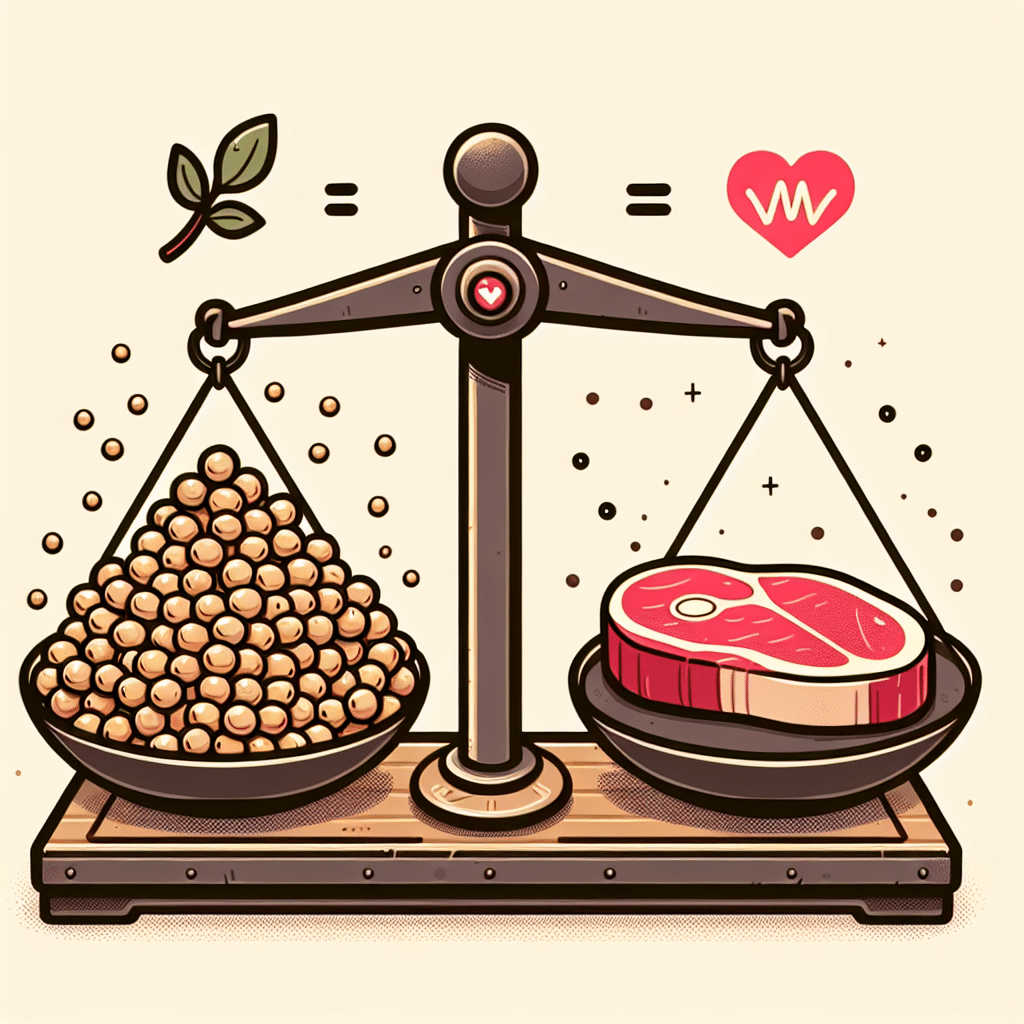Is Soy Protein Healthier Than Meat?
-
Table of Contents
- Soy Protein vs. Meat: Evaluating Health Benefits and Risks
- Nutritional Comparison of Soy Protein and Meat
- Health Benefits of Soy Protein
- Potential Risks and Considerations for Soy Protein
- Environmental and Ethical Considerations
- Case Studies and Statistics
- Conclusion: Balancing the Pros and Cons
- Discover ETprotein’s High-Quality Soy Protein Products
Soy Protein vs. Meat: Evaluating Health Benefits and Risks

When it comes to protein sources, the debate between soy protein and meat is ongoing. With the rise of plant-based diets and concerns about the environmental impact of meat production, many people are considering soy as a healthier alternative. This article delves into the nutritional aspects, health benefits, and potential risks of soy protein compared to meat, providing a comprehensive analysis for those looking to make informed dietary choices.
Nutritional Comparison of Soy Protein and Meat
Understanding the nutritional content of soy protein and meat is crucial in evaluating their health implications. Here’s a breakdown of their key nutritional components:
- Protein Content: Both soy and meat are excellent sources of protein, essential for muscle repair, immune function, and other vital processes.
- Amino Acid Profile: Meat contains all nine essential amino acids, making it a complete protein. Soy protein also offers a complete amino acid profile, which is relatively rare for plant-based proteins.
- Fat Content: Meat typically contains more saturated fat, which can contribute to heart disease. Soy protein is generally lower in saturated fat and contains heart-healthy polyunsaturated fats, including omega-3 fatty acids.
- Vitamins and Minerals: Meat is rich in B vitamins, iron, and zinc. Soy protein provides various nutrients, including iron, calcium, and magnesium, but the bioavailability of these minerals may be lower in plant-based sources.
Health Benefits of Soy Protein
Soy protein offers several health benefits that make it an attractive alternative to meat:
- Cardiovascular Health: The inclusion of soy protein in the diet has been associated with lower levels of LDL cholesterol and reduced risk of heart disease.
- Weight Management: Soy protein can promote satiety and may aid in weight loss efforts due to its lower calorie and fat content compared to meat.
- Reduced Cancer Risk: Some studies suggest that soy consumption may be linked to a lower risk of certain cancers, such as breast and prostate cancer.
- Menopausal Symptom Relief: Isoflavones in soy have been shown to alleviate hot flashes and other menopausal symptoms.
Potential Risks and Considerations for Soy Protein
While soy protein has many benefits, there are also potential risks and considerations to keep in mind:
- Allergies: Soy is one of the top eight allergens and can cause reactions in some individuals.
- Thyroid Function: Soy contains goitrogens, which can interfere with thyroid function, although this is typically a concern only for those with pre-existing thyroid issues.
- Hormonal Effects: The isoflavones in soy can mimic estrogen, leading to concerns about hormonal balance, particularly in men. However, most research indicates that moderate soy consumption does not adversely affect hormone levels.
- Genetically Modified Organisms (GMOs): A significant portion of soy production is genetically modified, raising concerns for those who prefer non-GMO foods.
Environmental and Ethical Considerations
The environmental impact of meat production is a growing concern. Livestock farming contributes significantly to greenhouse gas emissions, deforestation, and water usage. In contrast, soy production is generally more sustainable, using fewer resources and resulting in lower environmental impact. Ethical considerations also play a role, as many people choose soy protein to avoid the animal welfare issues associated with meat production.
Case Studies and Statistics
Several studies have compared the health outcomes of individuals consuming soy protein versus meat. For example, a study published in the American Journal of Clinical Nutrition found that replacing animal protein with plant protein, including soy, was associated with lower mortality rates. Additionally, the Adventist Health Studies have shown that vegetarians, many of whom rely on soy as a primary protein source, tend to live longer and have lower rates of chronic diseases compared to non-vegetarians.
Conclusion: Balancing the Pros and Cons
In conclusion, both soy protein and meat have their place in a balanced diet. Soy protein offers a complete amino acid profile, lower saturated fat content, and potential health benefits, such as improved heart health and reduced cancer risk. However, it’s essential to consider potential allergies, thyroid function, and hormonal effects. Meat provides high-quality protein and essential nutrients but comes with higher saturated fat content and environmental concerns. Ultimately, the choice between soy protein and meat depends on individual dietary needs, health goals, and ethical values.
Discover ETprotein’s High-Quality Soy Protein Products
If you’re looking to incorporate soy protein into your diet, ETprotein offers a range of organic bulk vegan proteins that are non-GMO and allergen-free. Their products, including organic rice protein, pea protein, and various seed proteins, are characterized by a neutral taste and high purity levels, making them an excellent choice for those seeking plant-based protein options. ETprotein caters to various industries, ensuring that you can find the right protein solution for your needs.
About ETprotein:
ETprotein, a reputable protein and L-(+)-Ergothioneine (EGT) Chinese factory manufacturer and supplier, is renowned for producing, stocking, exporting, and delivering the highest quality organic bulk vegan proteins and L-(+)-Ergothioneine. They include Organic rice protein, clear rice protein, pea protein, clear pea protein, watermelon seed protein, pumpkin seed protein, sunflower seed protein, mung bean protein, peanut protein, and L-(+)-Ergothioneine EGT Pharmaceutical grade, L-(+)-Ergothioneine EGT food grade, L-(+)-Ergothioneine EGT cosmetic grade, L-(+)-Ergothioneine EGT reference grade and L-(+)-Ergothioneine EGT standard. Their offerings, characterized by a neutral taste, non-GMO, allergen-free attributes, with L-(+)-Ergothioneine purity over 98%, 99%, cater to a diverse range of industries. They serve nutraceutical, pharmaceutical, cosmeceutical, veterinary, as well as food and beverage finished product distributors, traders, and manufacturers across Europe, USA, Canada, Australia, Thailand, Japan, Korea, Brazil, and Chile, among others.
ETprotein specialization includes exporting and delivering tailor-made protein powder and finished nutritional supplements. Their extensive product range covers sectors like Food and Beverage, Sports Nutrition, Weight Management, Dietary Supplements, Health and Wellness Products, and Infant Formula, ensuring comprehensive solutions to meet all your protein needs.
As a trusted company by leading global food and beverage brands and Fortune 500 companies, ETprotein reinforces China’s reputation in the global arena. For more information or to sample their products, please contact them and email sales(at)ETprotein.com today.












